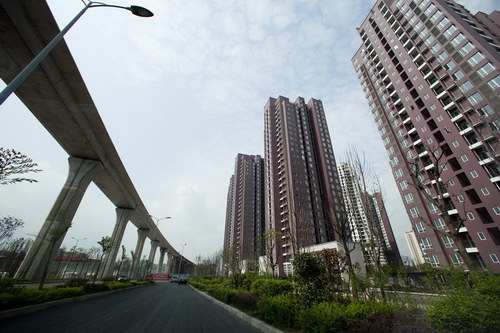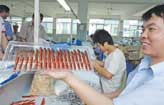Economy
A not-so-hot property
Updated: 2011-07-11 09:31
By Yu Ran (China Daily)
WENZHOU, Zhejiang - Tightened bank lending and falling prices are beginning to take their toll on property developers in some of the hottest markets around the country, from Beijing to Shanghai to Guangzhou.
 |
|
A railway running next to a social housing project in Chongqing. Some cash-thirsty developers have turned to risky 'underground' banking as China tightens bank lending. [Photo/Agencies] |
While many cash-strapped developers in major cities are trying to keep their heads low, resourceful entrepreneurs in Wenzhou, an energetic boomtown in Zhejiang province, are devising risky plans to keep the cash flowing and the party going. The merry-go-round is sucking in many billions of yuan from manufacturers, tired of having their profits squeezed by rising costs and an appreciating currency, and an army of depositors, disconsolate after years of negative real bank interest rates.
In the process, a burgeoning lending black market, or heizi in the Wenzhou dialect, is replacing local banks as the major source of funding to finance the town's undiminished building boom. Staying unseen, the key players in the heizi are the many underground lenders who operate in a legal gray area, taking deposits and making loans at interest rates that can reach 200 percent annually.
The extraordinarily high lending rates have enabled these underground banks to attract large deposits with promises of returns that are many times higher than those offered by banks. For example, one particularly aggressive underground bank is known to offer interest income of more than 16 percent for a one-year deposit, compared with an average of 3.5 percent for banks, while inflation is projected to be more than four percent in 2011.
And therein lies the risk. The game played by these Wenzhou developers and their financiers hinges on the belief that property prices in the town will continue to rise, even though that's not always the case. Further compounding the risk exposure is the fact that a considerable proportion of heizi money has gone into funding developments in other cities where a continuous property boom is anything but assured.
"As the average price in the property market is still quite high and the restrictive policies on private home purchases have been extended among the first- and second-tier cities, certain property developers have quit the market," wrote Shi Yongqing, the chairman of Centaline Property Agency Ltd, on his official blog.
China has issued a series of policies aimed at restricting the property market, including raising the downpayment ratio and warning banks against continuing to lend to developers.
As a result, there have been obvious signs of declining home sales in some major cities.
Shi added that the number of residential property deals will probably continue to decline, especially after the third quarter..
Statistics from the housing authorities in Wenzhou show that the number of deals involving pre-owned properties decreased by 31.48 percent in May, compared with the same month last year.
"The continual decline in the number of deals will affect the cash flow of property developers after the launch of their new projects and force them to take short-term loans from private capital," said a sales manager surnamed Jiang from a real estate agency in Wenzhou.
Many developers have had to try to get money from the gray market from time to time.
"Most of us property developers have to borrow money short-term at high interest rates from underwriting companies or private money lenders every three months, with maturity of about a week, if we have new projects to develop," said a developer who declined to reveal his name.

Specials

90th anniversary of the CPC
The Party has been leading the country and people to prosperity.

The write stuff
'Pen capital' goes back to drawing board for answers to economic changes taking shape in Zhejiang

Say hello to hi panda
An unusual panda is the rising star in Europe's fashion circles